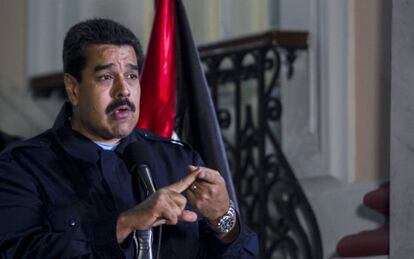Second cartoonist sacked after drawing ire of Venezuelan government
Roberto Weil’s sketch allegedly predicted assassination of a chavista politician

The second cartoonist in the space of a month has been fired by a Venezuelan media group with ties to the chavista regime for allegedly criticizing the government. Until this Monday, Roberto Weil worked for Dominical magazine, a Sunday supplement published by Grupo Últimas Noticias. Although the magazine offers articles on light-hearted topics, the case has obvious political implications and has revived the debate over the ownership of Venezuela’s private media companies.
The dismissal follows that of El Universal newspaper cartoonist Rayma Suprani, a hardened critic of the government, after she published a drawing depicting Chávez’s signature as a flatline on a heart-rate monitor last month.
On Sunday, Dominical was due to publish a cartoon depicting a vigil for a rat in what appears to be the nave of a church. Several other rats seated around a glass coffin listen as another rat speaks from a podium. “Our beloved Miguel was honest, cooperative and caring... We will always remember him as a wonderful rat.”
It would be good to investigate what motivated the author to draw this 15 days ago” Chavista minister Ernesto Villegas
Such a cartoon would not have provoked a scandal at any other time but, on the night of Wednesday, October 1, something unexpected happened: a chavista deputy, Robert Serra, and his assistant were brutally murdered. Weil had turned his work in two weeks before in order to meet the deadline for publication. Editors, however, thought it best to pull the cartoon page. They notified the author of the decision and he agreed.
In Venezuelan vernacular, a rat is a malicious person who operates under an odd code of ethics. In a note published on its website that same Sunday, the magazine said canceling the cartoon’s publication was a way to avoid “political associations” and twisting the knife in the wound that the most radical sector of the regime is nursing. Twenty-seven-year-old Serra was one of the foremost promoters of the Bolivarian Revolution’s message of self-determination among the youth.
Still, the decision to cancel the cartoon drew attention because of the context in which journalists have to work in Venezuela. In the last year-and-a-half, three of the largest media groups have changed hands and dropped their combative editorial styles in favor of pursuing government interests. Ernesto Villegas, a chavista minister for Caracas, fanned the flames by publishing the drawing on his Twitter account on Sunday morning. He revealed the reasons why it had not run in the magazine and said: “It would be good to investigate what motivated the author to draw this 15 days ago.”
The reference gave wings to the version of events that regime supporters believed: that radical opposition members planned Serra’s death. “You are a miserable son of a bitch, Weil,” Aragua Governor Tareck El Aissami said on Twitter, adding that the cartoon made “fun of the pain of the chavista people.”
Three of the largest media groups have changed hands and dropped their combative editorial styles
Roberto Weil’s dismissal shines the spotlight on the weakness of the country’s media owners when it comes to confronting misunderstandings with the government. Sources at Últimas Noticias said editors decided not to run the cartoon after “someone from the very top” pressured them. The media group’s president, Héctor Dávila, also oversees the morning papers El Mundo Economía and Negocios, as well as Líder, a sports publication.
Since the days of Hugo Chávez, the regime has been engaged in a constant battle with the country’s cartoonists, many of whom are held in enormous prestige. In 2000, when relations with the media began to sour, the late president reprimanded the doyen of cartoonists, Pedro León Zapata from El Nacional newspaper, during a public speech. “How much did they pay you to do that?” asked an irate Chávez as he held up a cartoon depicting a military saber with the caption: “I like a firm and discreet civil society.” The drawing was Zapata’s interpretation of Chávez’s early attempts to keep Venezuelan society under his aegis.
Translation: Dyane Jean François
Tu suscripción se está usando en otro dispositivo
¿Quieres añadir otro usuario a tu suscripción?
Si continúas leyendo en este dispositivo, no se podrá leer en el otro.
FlechaTu suscripción se está usando en otro dispositivo y solo puedes acceder a EL PAÍS desde un dispositivo a la vez.
Si quieres compartir tu cuenta, cambia tu suscripción a la modalidad Premium, así podrás añadir otro usuario. Cada uno accederá con su propia cuenta de email, lo que os permitirá personalizar vuestra experiencia en EL PAÍS.
¿Tienes una suscripción de empresa? Accede aquí para contratar más cuentas.
En el caso de no saber quién está usando tu cuenta, te recomendamos cambiar tu contraseña aquí.
Si decides continuar compartiendo tu cuenta, este mensaje se mostrará en tu dispositivo y en el de la otra persona que está usando tu cuenta de forma indefinida, afectando a tu experiencia de lectura. Puedes consultar aquí los términos y condiciones de la suscripción digital.








































